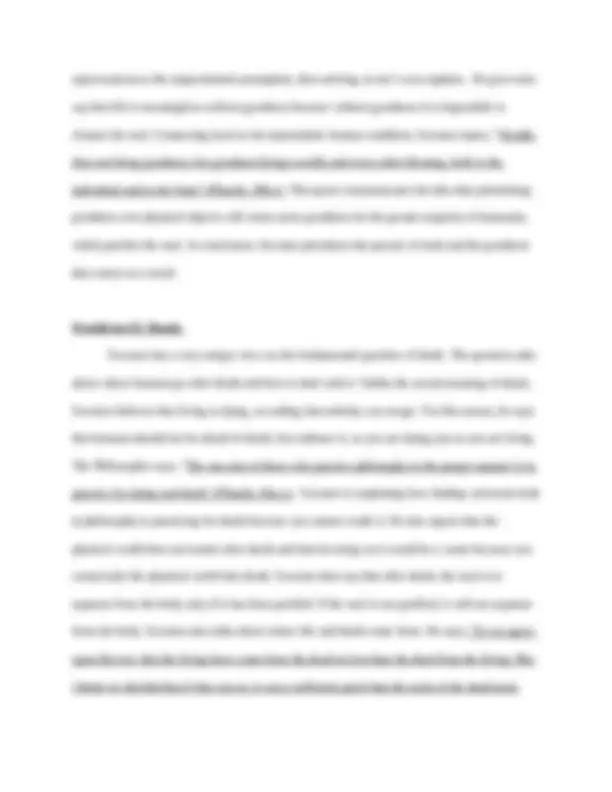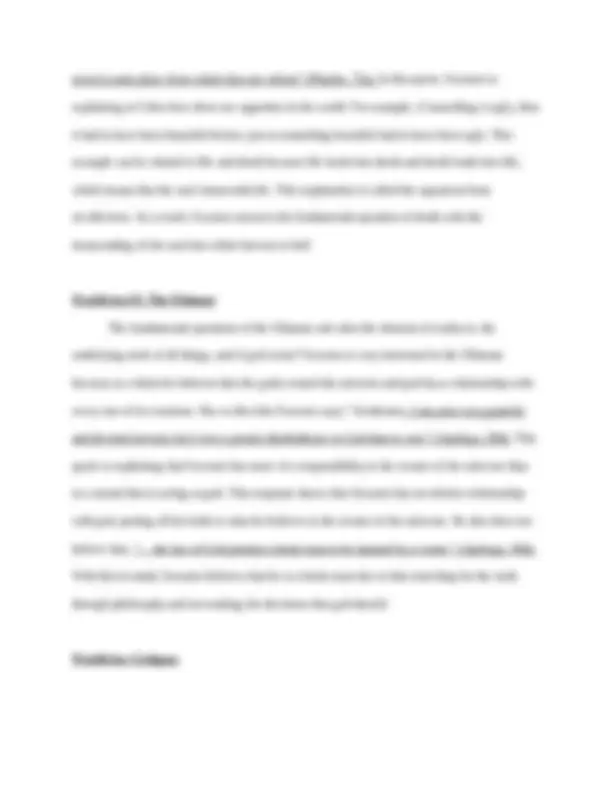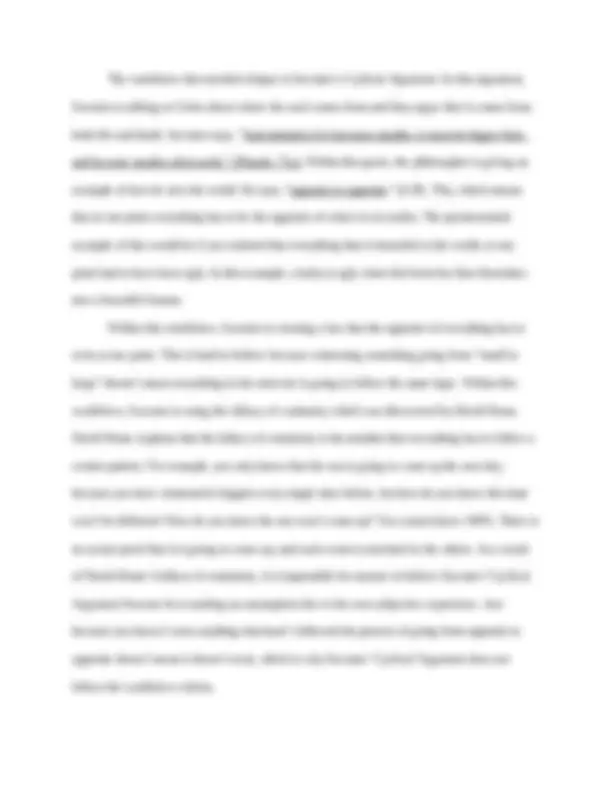





Study with the several resources on Docsity

Earn points by helping other students or get them with a premium plan


Prepare for your exams
Study with the several resources on Docsity

Earn points to download
Earn points by helping other students or get them with a premium plan
Community
Ask the community for help and clear up your study doubts
Discover the best universities in your country according to Docsity users
Free resources
Download our free guides on studying techniques, anxiety management strategies, and thesis advice from Docsity tutors
Describes the philosophy of socrates in detail.
Typology: Essays (university)
1 / 6

This page cannot be seen from the preview
Don't miss anything!




Jackson Nathan Phil 10/22/ Socrates Paper : The purpose of this paper is to analyze the worldviews of Socrates through four out of the eight fundamental questions. Quotations from this essay are from The Last Days of Socrates by Plato but translated by Hugh Tredennick and Harold Tarrant, as well as excerpts from Socrates by George Rudebusch. The Last Days of Socrates will be shortened to LDS to decrease repetition. The four fundamental questions that will be answered through Socrates Worldviews include: Conditions/Problems, Death, The Ultimate, and Purpose. All formulated ideas in this essay have been influenced by the aforementioned sources. Worldview#1: Condition/Problems One of the first fundamental questions that is addressed by Socrates is the idea of Condition or the Status Quo of humans and what problems are faced. This question asks about what problems humanity faces, and what causes humans to make bad decisions. Socrates explains his viewpoint to Simmias on the condition of human behavior in the excerpt Phaedo and says, “All wars are undertaken for the acquisition of wealth; and the reason why we have to acquire wealth is the body and its desires.” (Phaedo, 66c). Socrates explains that humans are driven by materialism and the physical desires. In the quote aforementioned, he talks about how the need for physical objects starts wars and people prioritize these objects over unimportant ideas. This idea of affluence stems from selfishness and the competitive environment of
capitalism. Socrates solution to this greed, is to value the unphysical intangible ideas, that our goal as humans is to improve the soul. He goes on to say,” It seems that so long as we are alive, we shall keep as close as possible to knowledge if we avoid as much as we can all contact and association with the body, except when they are absolutely necessary; and instead of allowing ourselves from it until God himself gives us deliverance.”(Phaedo, 67a). As a result of this viewpoint, Socrates believes that the less you value the physical world, the more you will be able to achieve truth and knowledge. Connecting it back to the evils of the body, Socrates argues that the soul is not purified and that the goal of our life is the separate the soul from our body, organizing the bodies basics and not its wants. Worldview#4: Purpose The next fundamental question that Socrates addresses is the idea of purpose. This question asks about what the meaning of life is, and what purpose humans serve living. The question interests Socrates because he believes that the purpose of life is to create goodness. Goodness is an umbrella term that includes the development of the soul which then can be rewarded by the deliverance of god. Socrates argues, “If on the other hand, I tell you to let no day pass without discussing goodness and all the other subjects about which you hear me talking and examining both myself and others is really the very best thing that a man can do, and that life without this sort of examination is not worth living, you will be even less inclined to believe me.”(Phaedo, 38a) In this, he states that you must question and be skeptical of the world around you, to find the underlying truth, which will lead to goodness. To do this, Socrates created the Socratic Method. If followed correctly, it will arrive at the truth. These steps start with identifying common unquestioned assumptions, asking other’s opinions, and analyzing the
exist in some place from which they are reborn” (Phaedo, 72a). In this quote, Socrates is explaining to Cebes how there are opposites in the world. For example, if something is ugly, then it had to have been beautiful before, just as something beautiful had to have been ugly. This example can be related to life and death because life leads into death and death leads into life, which means that the soul transcends life. This explanation is called the argument from recollection. As a result, Socrates answers the fundamental question of death with the transcending of the soul into either heaven or hell. Worldview#3: The Ultimate The fundamental questions of the Ultimate ask what the element of reality is, the underlying truth of all things, and if god exists? Socrates is very interested in the Ultimate because as a theist he believes that the gods created the universe and god has a relationship with every one of its creations. Due to this idea Socrates says,” Gentlemen, I am your very grateful and devoted servant, but I owe a greater disobedience to God than to you;” (Apology, 29d). This quote is explaining that Socrates has more of a responsibility to the creator of the universe than to a mortal that is acting as god. This response shows that Socrates has an inferior relationship with god, putting all his faith in what he believes is the creator of the universe. He also does not believe that, “… the law of God permits a better man to be harmed by a worse.” (Apology, 30d). With this in mind, Socrates believes that he is a better man due to him searching for the truth through philosophy and not making the decisions that god should. Worldview Critique:
The worldview that needed critique is Socrates’s Cyclical Argument. In this argument, Socrates is talking to Cebes about where the soul comes from and they argue that it comes from both life and death. Socrates says, “And similarly if it becomes smaller, it must be bigger first, and become smaller afterwards.” (Phaedo, 71a). Within this quote, the philosopher is giving an example of how he sees the world. He says, “opposite to opposite.” (LDS, 70e), which means that at one point everything has to be the opposite of what it is in reality. The quintessential example of this would be if you realized that everything that is beautiful in the world, at one point had to have been ugly. In this example, a baby is ugly when first born but then flourishes into a beautiful human. Within this worldview, Socrates is creating a law that the opposite of everything has to exist at one point. This is hard to believe because witnessing something going from “small to large” doesn’t mean everything in the universe is going to follow the same logic. Within this worldview, Socrates is using the fallacy of continuity which was discovered by David Hume. David Hume explains that the fallacy of continuity is the mindset that everything has to follow a certain pattern. For example, you only know that the sun is going to come up the next day because you have witnessed it happen every single time before, but how do you know this time won’t be different? How do you know the sun won’t come up? You cannot know 100%. There is no actual proof that it is going to come up, and each event is unrelated to the others. As a result of David Hume’s fallacy of continuity, it is impossible for anyone to believe Socrates’ Cyclical Argument because he is making an assumption due to his own subjective experience. Just because you haven’t seen anything that hasn’t followed the process of going from opposite to opposite doesn’t mean it doesn’t exist, which is why Socrates’ Cyclical Argument does not follow the worldview criteria.